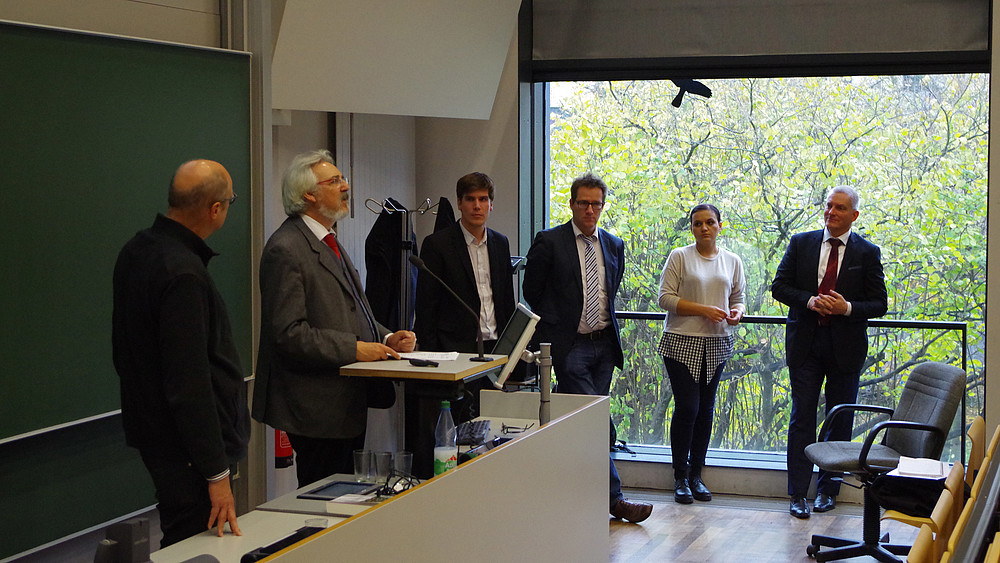Many well-wishers attended the 20th anniversary of the "Culture and Management Görlitz" degree program on 16 November.

For the twentieth anniversaryfoundinganniversary of the founding of the degree program"Culture and Management Görlitz" programat the Zittau/Görlitz University of Applied Sciences was published in theLitterata on November 25, 2017, the following photo and text report on the ceremonyand the November conference of the University and the Institute for Cultural Infrastructure Saxony.
On the evening of November 16, 2017, the twentieth anniversary of the founding of the "Culture and Management Görlitz" course at the Zittau/Görlitz University of Applied Sciences was commemorated with a festive event in the Kreativhaus Klingewalde.
The founder of the course, Prof. Dr. Matthias Theodor Vogt, welcomed students and graduates, entrepreneurs, cultural workers, politicians and academics from near and far.
Ulf Großmann, President of the Cultural Foundation of the Free State of Saxony, who was Mayor of the City of Görlitz 20 years ago, outlined the circumstances of the foundation. The Institute for Cultural Infrastructure Saxony spent DM 1.5 million at the time to create an intellectual forum for coping with the transformation processes that could open a gateway to Central Europe.
You can find Ulf Großmann's greeting here.
Prof. Dr. Friedrich Albrecht, Rector of the Zittau/Görlitz University of Applied Sciences, acknowledged the contribution of the course as an important enrichment of the university's educational profile and outlined (although not yet decided and without wishing to prejudge faculty sovereignty) "Interculturality" and "Creative Industries" as possible new directions for the course.
You can find the Rector's greeting here.
After the Rector's speech, the representatives of the Hungarian partner university Pécs stepped forward to present the agreement for the cross-border Master's degree program Pécs/Görlitz.
Former Rector Prof. Dr. Peter Dierich, who had taught the subject "Business Mathematics" on the course, expressed his recognition of the highly motivated students. He summarized them in the convincing formula: "university - creative - solid".
You can find Prof. Dr. Peter Dierich's contribution here.
The well-known sociologist Prof. Dr. Karl-Siegbert Rehberg, editor of the Arnold Gehlen Complete Edition published by Vittorio Klostermann, was reserved for the keynote speech. He himself admitted that his topic was not exactly that of a keynote speech. He titled his speech "Renouncing politics as a signature of the times? By addressing 'the Occident' as a place of refuge for lost homeliness, he touched on a topic that has attracted a great deal of attention in recent years, but which has also led to a West-East controversy under the buzzword "populism". In the background, images from Dresden showed the "Occident" as a place of refuge for lost homeliness. Professor Rehberg brought a variety of aspects to the examination of the problem and triggered a lively discussion.
Prof. Dr. Stefan Garsztecki, Dean of the Faculty of Philosophy at Chemnitz University of Technology and, together with Professor Vogt, doctoral supervisor of some alumni of the course, combined his welcoming address with a transition to the culinary part of the event in the first floor hall. The guests chatted for a long time over Polish dumplings and Hungarian wine.
On the morning of November 17, the scientific conference began with a presentation by Professor Vogt. We asked him to summarize the arguments of his contribution in an essay entitled "When angry citizens show Berlin their bare buttocks".
SPIEGEL editor Alexander Smoltczyk moderated the first part of the conference, "Visibility in public and semi-public spaces".
This was followed by contributions from renowned academics from Germany and abroad, as well as from two doctoral students from Tbilisi and Nantes and a graduate student from the "Culture and Management Görlitz" program in Hanover.
The conference ended on the afternoon of November 17 with two regional forums, which offered citizens of the region the opportunity to enter into a discussion with scientists and to put forward many thought-provoking arguments.
Report by Clara Schwarzenwald, which you can also find here.
We would like to thank Mironde-Verlag for their kind permission to reprint this report!